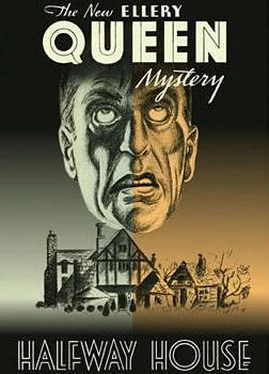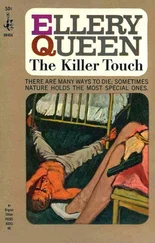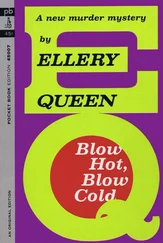“What,” whispered Andrea, “do you mean, Mrs. Wilson?”
Bill said slowly, “As Joseph Wilson he married my sister on February twenty-fourth, 1925. Over two years before he married your mother, Miss Gimball.”
The only sounds for seconds after was the short sharp cry wrung from Jessica Gimball. Then she said, “1925? You accuse him of being a bigamist, me of — of not... You’re lying, the pack of you!”
“Are you sure, Bill Angell?” whispered Andrea Gimball. “Oh, are you sure?”
Bill passed his hand over his lips. “It’s true, Miss Gimball, and we can prove it. And unless you can produce a marriage certificate antedating February twenty-fourth, 1925, your mother is in for it. We’ve nothing but justice on our side, and we must protect ourselves.”
“Oh, but this is infamous!” said Mrs. Gimball furiously. “There must be a mistake somewhere. There must!”
Grosvenor Finch said, “Now let’s not be hasty, please. Mr. Angell, Mrs. Gimball is naturally overwrought, and of course she’s sorry for what she said about your sister. Can’t this be adjusted in some way? No, Jessica! Perhaps, Mr. Queen, a little influence—”
“Too late,” said Ellery coldly. “You saw that red-haired young woman fly out of here. She’s the press. The story is already on the wires, Finch.”
“But this bigamy angle. She hasn’t heard that. I’m sure—”
Bill scowled and began to pace about. “Nothing on earth will stop those bloodhounds from hunting up the marriage dates. We’ll have to face it together. God knows we’re all in the same mess.” Lucy sat quietly, still as death.
“Very well,” said Finch slowly. The muscles of his large jaw were churning. “If it’s to be a battle, I’ve a card to play—”
“I think,” said a sardonic voice from the corner, “that I’ve let this go just about far enough.” Chief De Jong grinned at them without humor; they had forgotten him. “Now that everybody’s getting ugly, I’ll get tough myself. Murphy, you took it all down?” The detective in the doorway chewed his pencil, nodding. “Now, then,” continued De Jong, striding forward, “let’s get organized. You first, Queen. I think your actions call for an explanation.”
Ellery shrugged as he put his pipe away. “This man’s face bothered me all evening. I didn’t know why. Then it came back to me. The irritant was a resemblance. I attended a banquet some months ago in honor of somebody or other, and I met and conversed with a man who, I saw, might have been the twin brother of the man I had been told tonight was Joe Wilson, Lucy’s husband. But my tête-à-tête had been introduced to me as Joseph Kent Gimball of New York. When I recalled Joseph Wilson’s habitual absence from his Philadelphia home, it seemed to me a tragic possibility that Wilson and Gimball were the same man. So I went down the road and telephoned Gimball’s home in New York.”
“We’d have spotted it soon enough,” said De Jong grudgingly. “So?”
Ellery stared at him. “The only one in was Jasper Borden, Gimball’s father-in-law. I asked a few questions, discovered that Gimball hadn’t been home since the middle of last week, knew I was on the right track, and announced what had happened. Mr. Borden said his family was out, but that he’d sound the tocsin and send them out here as soon as possible.”
“Borden, hey?” muttered De Jong. “Old railroad man. Why isn’t your father with you, Mrs. Gimball?”
Andrea sighed. “Grandfather hasn’t stirred from the house for several years. He suffered a stroke in 1930 that paralyzed his entire left side.”
“Where were you people tonight? Where’d the old boy reach you?”
“Mother and I attended a charity ball at the Waldorf. We were there with a party of friends. Mr. Finch, my fiancé Mr. Burke Jones of Newport, Mrs.—”
“All together, hey?” said De Jong. “Big ball, I suppose?” For some reason not altogether clear, Bill Angell felt himself flushing. He might have known, he thought. He glanced at the girl’s face, and then at her left hand. She had slipped the setting off her finger.
“If you mean,” said Finch icily, “that any of us could have stolen off, driven out here, and stabbed Joe Gimball to death, I suppose you would be hypothetically correct. But if you’ve quite finished with this nonsense, I have something to say—”
“A good alibi never hurt anybody, see?” drawled De Jong. “Where’s this boy-friend of yours, Miss Gimball? This Jones.”
“We weren’t sure that it was Joe who’d been...” Andrea caught herself up; she avoided Bill’s gaze. “Well, I–I didn’t tell Burke. Grandfather spoke to Mother on the telephone when he had located us, and we didn’t believe it. But he was so insistent we felt we had to come and see. I didn’t want to involve Burke in a — in a...”
“I get it, I get it,” said De Jong. “Might spoil the match. Boy-friend jilts gal. Bad stuff for the papers. Nuts! Now, Mr. Finch, you’ve been steaming to get something off your chest. Go to it.”
“Under ordinary circumstances,” replied Finch in a stiff tone, “I should dislike even to bring the matter up. But we have our position to defend as well. This middle-class antagonism toward wealth, De Jong, can be damned annoying at times. Yes, I’ve something to reveal; and I’m afraid it’s going to prove unpleasant.”
Ellery stirred. “May I suggest you come to the point?”
“I suppose you do not know who I am. It wouldn’t matter ordinarily, and I shouldn’t bring it up; but it happens to be relevant to what I have to say. I am Executive Vice-President of the National Life Insurance Company, you see.”
“Yeah?” said De Jong; he did not seem impressed, although the National was one of the largest life-insurance companies in the world.
“In the course of my connection with the company,” continued Finch gently, “I’ve had occasion to insure many of my friends. Not as a broker, you understand — we’ve progressed since those days.” He smiled a little. “Purely as an accommodation. My friends call me the highest-paid insurance broker in the world. Ha, ha!”
“Ha, ha,” said De Jong sourly. “So?”
“Among the small number whose policies I have handled personally was Gimball. We’ve often jested about it. Rather remarkable policy. He came to me in ’30 and asked me to insure him for a million dollars.”
“A what ?” gasped the policeman.
“A million dollars. It isn’t the largest policy I’ve seen drawn, by any means, although it’s the only one I’ve ever heard of issued to a man so young. You see, in 1930 Gimball was only thirty-three years old. The annual premium came to a mere twenty-seven thousand or so. At any rate, we managed it for him; he was in perfect health; and the policy was issued as of that year.”
“All by the National?” murmured Ellery. “I’ve always thought some law or other forbids one insurance company assuming such a large risk.”
“Quite true. The legal limit for a single company is three hundred thousand. In the case of a contract exceeding that amount the excess is underwritten by other companies; quite the usual procedure. The National took three hundred thousand, and we arranged matters so that seven other companies took up one hundred thousand each. The contract was handled as a unit, and Gimball paid his premiums through the National. Policy’s in excellent condition — no loans outstanding and the premiums are paid up to date.”
“A million dollars,” said Bill dazedly. De Jong looked down at the still body in awe.
“Just what,” asked Ellery in a patient tone, “is the point?”
The tall man looked him in the eye. “I am an officer of the National,” he said dryly. “Every insurance company has occasion to question the death of some insured. We have here a case of out-and-out murder. A case of murder, moreover, in which the victim was carrying a million dollars’ worth of insurance. I presume you know the law. In effect the law says that an insurance contract is automatically cancelled upon sufficient proof that the insured met his death through the instrumentality of his beneficiary .”
Читать дальше












